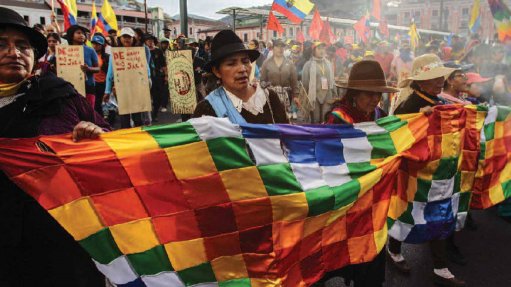
When President Lenín Moreno took office in May 2017, he inherited an economy heavily reliant on extractive industries and an executive branch that had, during the previous decade, amassed broad powers to curb public debate of its policies on the environment and other pressing issues. Under his predecessor, President Rafael Correa, the government abused these powers to harass, intimidate, and punish Ecuadorians who opposed oil and mining projects that the president endorsed.
When environmental activists and indigenous people mobilised to protest President Correa’s policies, he took to the airwaves to denounce them. In 2013, he issued a presidential decree allowing his administration to arbitrarily shut down civil society organisations—which it did later that year, dissolving the Pachamama Foundation (Fundación Pachamama in Spanish), one of the country’s most prominent environmental groups. In 2016, his administration sought to do the same with another leading environmental group, Ecological Action (Acción Ecológica in Spanish), but backtracked after the move provoked an international outcry, including condemnation by UN experts.
The Correa administration also used the criminal justice system to target environmentalists and indigenous leaders to be prosecuted. Human Rights Watch examined three of the most prominent cases involving indigenous leaders and environmentalists accused of criminal activity by the Correa administration. In two of the cases, Human Rights Watch found that prosecutors did not produce sufficient evidence that supports the serious charges they brought. In the third case, a criminal investigation involving six indigenous leaders and an environmentalist has been kept open for four-and-a-half years even though it has failed to produce any evidence of wrongdoing.
Since taking office, President Lenín Moreno has signalled a change in direction from his predecessor, opening a dialogue with environmentalists, indigenous leaders and other government critics. His administration reinstated the Pachamama Foundation. He replaced the presidential decree that allowed the government to shut organisations down with one that is less far-reaching, but still problematic (the provision used to shut down Pachamama Foundation remains in place.)[1]
Despite these positive steps, the abusive criminal prosecutions examined in this report remain unaddressed. In one case, a baseless conviction on charges of terrorism was overturned by Ecuador’s National Court of Justice—only to be replaced with a conviction for an entirely distinct offence that the accused has never been tried for. And no wider steps have been taken to ensure that the criminal justice system is not abused to target indigenous leaders and environmentalists again in the future.
Report by the Human Rights Watch